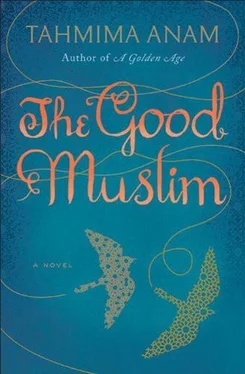Her brother was here, somewhere among the worshippers. Zaid had given her the idea. ‘Abboo will be at the Ijtema,’ he said. The upstairs had emptied out, no more footsteps on the ceiling or groups of jamaatis pooling in front of the gate.
‘Maybe you can meet him,’ Zaid said. Someone had shaved his head that morning, there were two neat crimson scars at the nape of his neck. She considered the idea. Perhaps it was time to face Sohail.
The Ijtema provided free medical clinics to all pilgrims. It was easy to offer her services, set up a curtained area for women. And here she was. Millions of people. Somehow it was easier to meet him in this context, his foreignness multiplied, but made plainer, by the replication of people like him, clusters of men in beards and white robes. Since her return he had been away, travelling from one jamaat to another, and she had been relieved to accustom herself to the house, the city, without the prospect of seeing him. But now she was ready.
Though he was a relative newcomer to the Tabligui movement, Sohail was already known for his bayaan, his sermons. Maya could bet none of the people who listened to him now had any idea where he learned to speak like that. If they had asked her, she could have told them about the time when at sixteen he beat the debating champion in college, the very handsome Iftekar Khan. Speak for or against: does the arms race decrease the possibility of another world war?
Sohail had studied Iftekar Khan and decided he was, in fact, a very fragile man. Twice the All-Pakistan Debating Champion, he had risen too high; he was full of the fear of disappointing his fans. So Sohail paused, longer than was necessary, before beginning his two-minute opening. And he spoke very slowly. By then Iftekar was already jamming his finger between his neck and his shirt collar, trying to create a bit of space for his swelling throat, his itch to fill the silence. And Sohail continued to draw out his words, so that, after he had won, the college newspaper dubbed him the Tortoise that Beat the Khan. It was on that day that he learned his trick of manipulating the moment, of deciding the beat and tempo of a conversation, and it was that day that led him to become president of his university hall, and the object of much speculation among the girls, and eventually a protester on the streets, shouting through a megaphone against the army. It was the day that led him, finally, to the war.
But none of these pilgrims would know that. They probably believed it was a gift from God.
Zaid was flitting in and out of the medical tent, translating the day. ‘There’s an American tent,’ he said, gasping. ‘They gave me this.’ It was a red-and-green-striped sweet in the shape of a walking stick.
‘You can eat it after lunch.’ It would be a very late lunch; already the afternoon prayer was under way. Along the banks of the Turag River, thousands upon thousands of men bent their heads and faced west. They pointed themselves towards Mecca, but they were also bowing to the afternoon sun, which cast sharp beams into their eyes as they raised their hands. Together they stood, turned their heads from side to side. They folded their hands, kneeled and performed the Sejda, putting their foreheads to the ground. It was at this moment, Maya thought, recalling something her mother had told her, that the heart rose higher than the head.
Zaid led her to a tent and found them a small square of carpet. A woman walked past, willowy in her chador, and handed them a bowl of spicy chickpeas. ‘As-Salaam Alaikum,’ she said, pinching Zaid’s cheek and wandering away.
Maya unwrapped their lunch, a box of chicken and rice. ‘I saw Abboo,’ Zaid said.
The chicken dried up in her mouth. ‘Where?’
‘Over there.’ He pointed in the direction of the praying men on the river bank.
Here was her chance. At the prospect of seeing him again, she allowed herself a sliver of hope. A reunion. She would approach him, ask about Zaid. Toe in the water. See if there was somewhere they could meet, she and her brother. She had travelled to his home turf, he might like that. She looked at the boy, allowing herself, for a moment, to wonder what it would be like to take charge of him. School, first of all. He would go to school. She would have to teach him not to wander off in the middle of a sentence, and how to sit behind a desk all day. He would have to wear a uniform and carry his tiffin to the playground.
They finished their chicken and rice, washed their hands by the side of the tent. ‘All right,’ she said, ‘let’s go and find your father.’
They pushed through the stream of pilgrims and made their way to the river, passing row after row of tents, each one housing tribes of men, their lungis hanging on strings to divide the space between them. They would eat, sleep and pray here for a whole week. The larger tents were set up with speakers and microphones and makeshift stages where famous orators from India, imams from Jerusalem or Shanghai or Mozambique, would stand and spread the word. Maya had heard on the news that it was the biggest gathering of Muslims after the pilgrimage to Mecca. Even the Dictator would be attending the final recitation, to seek blessings from the spiritual leaders of the jamaat.
The prayer ended; men shuffled away, putting their shoes back on and wiping the sun from their eyes. Zaid was holding her hand and dragging her forward. They pushed against the tide of men leaving the prayer ground, inching slowly towards the lip of the river. Large boats packed with pilgrims were floating on the river, waiting for a space to drop anchor. Impatient, some jumped into the water and waded, their capped heads bobbing as they swam. Zaid wriggled his way through the crowd, tugging on Maya’s arm, and finally they came to a stretch of sand.
‘There,’ Zaid said, pointing. A clutch of men stood talking. Sohail was smiling, gesturing with his hands. He embraced each person in turn, and then the group dispersed. Zaid hesitated for a moment, looking up at her as if she were about to tell him what to do, and then he released her hand and scurried away, disappearing into the crowd.
Sohail was standing with his back to her, gazing into the water, his hands folded behind him. She watched him quietly for a moment. She had practised this meeting countless times. His back was broad, his hips. The white that draped his body ended above his ankles, which were black, his thick heels in a pair of cheap rubber sandals.
He turned. They regarded one another for a moment, and then he held out his arms to her, and she dived straight into them until she was wrapped in his pillowy chest, his fragrance of rosewater and attar.
He kissed her forehead. ‘As-Salaam Alaikum,’ he said. She clung to him, and slowly, gently, he shifted away.
‘Walaikum As-Salaam,’ she heard herself reply. ‘How are you?’
‘I am well, by the grace of Allah.’
Maya shifted her weight from one foot to the other. The things she wanted to say, dense, historical words, sat at the bottom of her. ‘I’m so sorry, about Silvi.’
There was a time when she would know, from the way he glanced at her, or the shape of his lips when he spoke, exactly what he was thinking. But he had learned to disappear within himself, and his face told her nothing. ‘It was her time.’
She wanted to touch him. He was fragile and he was remote. She watched the Adam’s apple moving up and down in his throat. She steadied herself. ‘You know I’ve come back,’ she began.
‘Yes, I know.’
He knew. He hadn’t come down to see her; she hadn’t gone up to see him. Brother and sister, once inseparable. Tell me, she thought, tell me you’ve missed me, that you wished for my return. That you want to make up. He stepped closer to the water, and she followed. ‘I–I’d like your permission to enrol Zaid in school. There’s a new one on Road 4, I went to see the headmistress and she agreed to take him at the start of the next term.’ She was so nervous. Every word was a struggle.
Читать дальше












